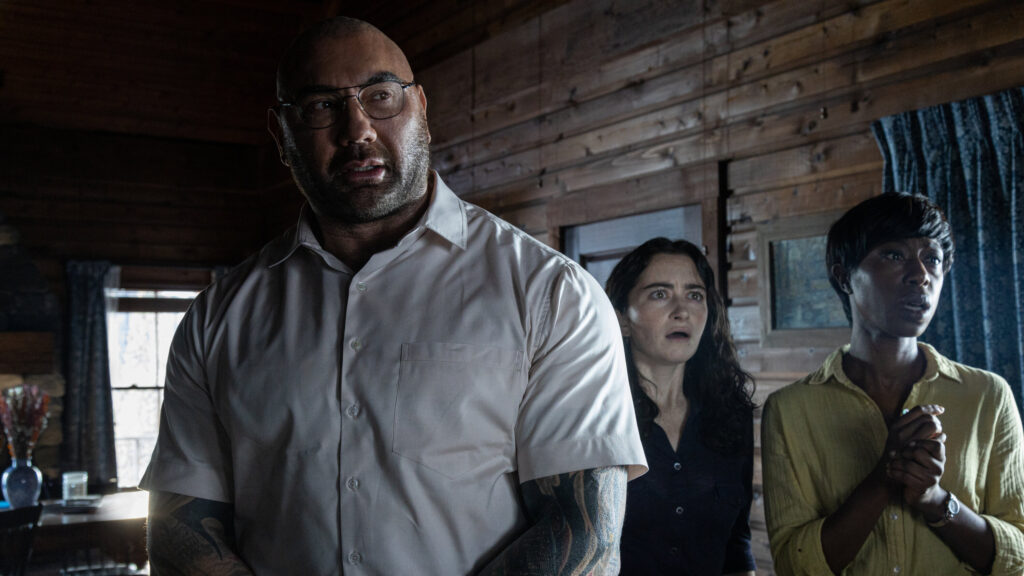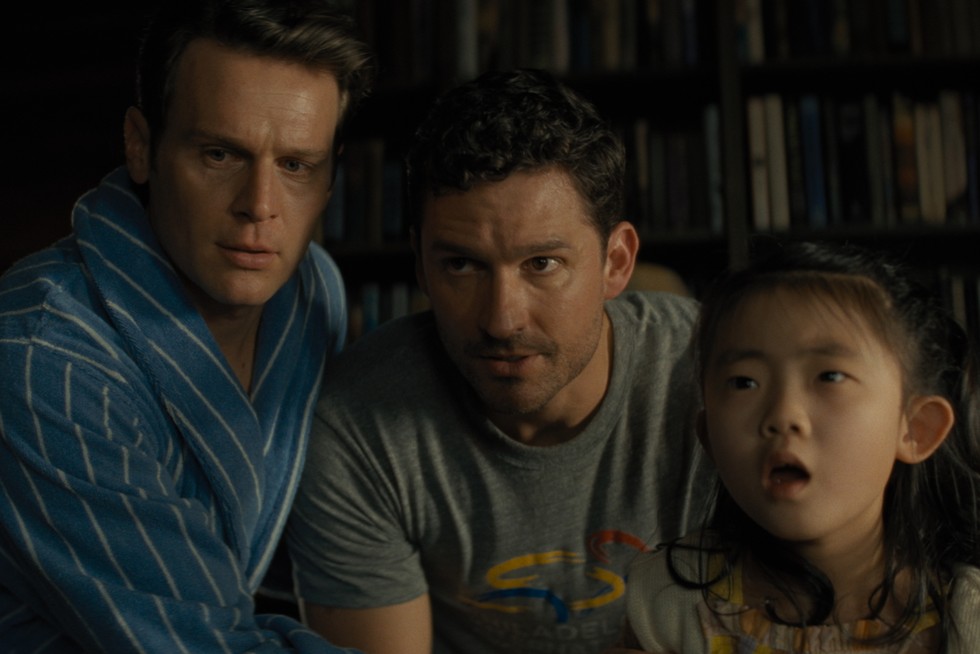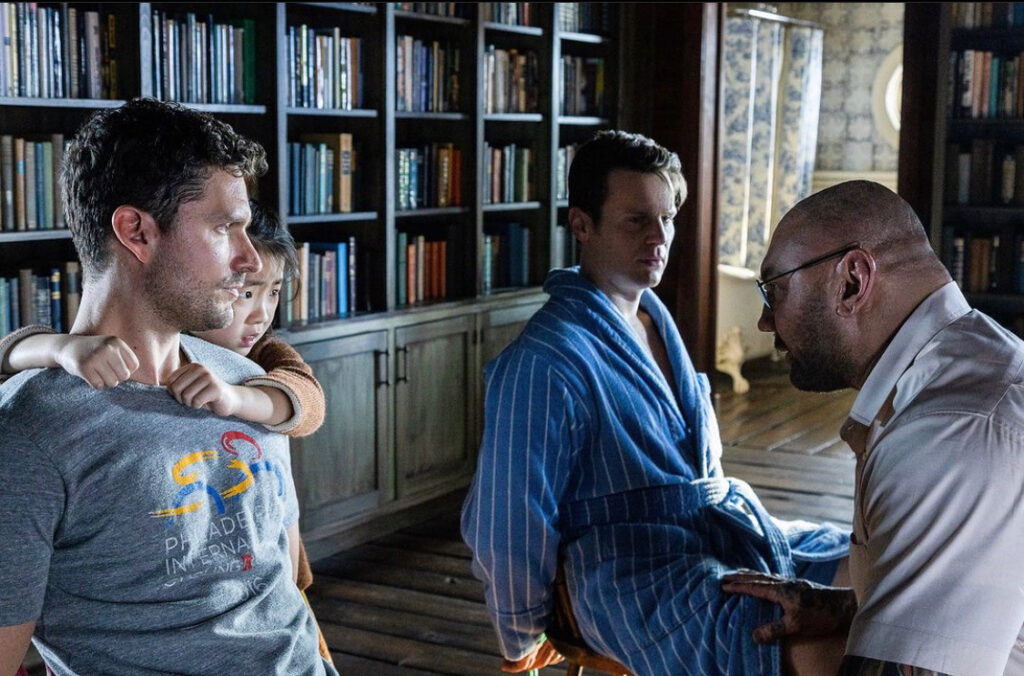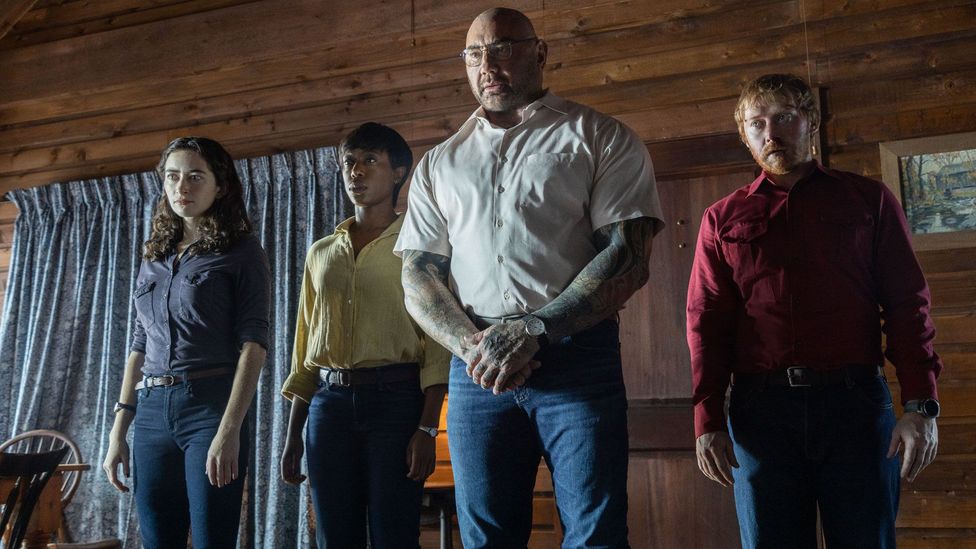
In one of the many tense sequences in M. Night Shyamalan’s The Village, a young woman implores a housemate to shut the door before a malevolent force breaks through: “Don’t let them in!” That same pleading desperation permeates the opening scenes of Knock at the Cabin, Shyamalan’s new thriller, which finds a vacationing family—an adorable seven-year-old named Wen (Kristen Cui) and her two fathers, Eric (Jonathan Groff) and Andrew (Spoiler Alert’s Ben Aldridge)—under sudden assault from a quartet of armed, menacing invaders. But where The Village cultivated a tone of suffocating suspense (what will happen?), the mood here is instead one of clammy inevitability. The trespassers break through the cabin’s fortifications with minimal resistance, quickly tying up our heroes and establishing that the movie will not unfold as a typical home-invasion yarn. Sure, you may briefly wonder whether the victims will use their collective guile to escape (did someone just mention Chekhov’s gun?), but mostly you ponder why the intruders are there and—once you learn that answer—whether there is any legitimacy to their stated purpose.
Ever the economical storyteller, Shyamalan answers the first of those questions in a matter of minutes. (Even he isn’t as efficient as the film’s trailer, which naturally divulges the entire plot.) The housebreakers—led by gentle-giant Leonard (a very fine Dave Bautista), who’s joined by the fretful Sabrina (Nikki Amuka-Bird), the timid Adriane (Abby Quinn), and the surly Redmond (Rupert Grint, currently starring on the Shyamalan-produced Servant)—behave according to a peculiar, seemingly contradictory code. On the one hand, they are obviously threatening, with their crude weapons (mallets, picks) and their grim determination. Yet despite their forcible entry and disturbing fervor, they insist—with apparent honesty—that they aren’t there to hurt anyone. Rather, they solemnly inform their captives that unless the family sacrifices one of its own, the world will end. And to prove the truth of their purported prophecy, they will ritualistically kill one of their own until the prisoners—watching helplessly, and goosed by ensuing television reports of global bedlam—resolve to make an impossible choice.
This is a faintly ridiculous premise, a fact not lost on Eric and (more sharply) Andrew, who react to Leonard’s pronouncements with the expected mix of panic and disbelief. Yet it’s also a very stressful one, and Shyamalan imbues the absurdity of the scenario—the screenplay, which he wrote with Steve Desmond and Michael Sherman, is based on a novel by Paul Tremblay—with an admirable degree of gravity. Knock at the Cabin, which adopts KC and the Sunshine Band’s “Boogie Shoes” as its surprising leitmotif, asks you to slip inside Eric and Andrew’s terrified headspace—first to contemplate how you might realistically respond to such a maniacal attack, then to recalibrate your instincts as you wonder, against all odds, if Leonard and his cohorts might actually be right.

The recent model for this formula is Yorgos Lanthimos’ The Killing of a Sacred Deer, which found a ruthlessly logical doctor at the mercy of vengeful, inexplicable sorcery. But where that picture was a chilling study of remorseless retribution (Colin Farrell’s character was ordered to murder a member of his own family, lest they all perish), Knock at the Cabin is more somber and empathetic. Though its style carries the tone and texture of a horror movie—Shyamalan amplifies the tension with taut camerawork and brooding atmospherics (the bump-in-the-night score is by Herdís Stefánsdóttir)—its story follows the trajectory of an ethical thought experiment. With the earnest curiosity of a freshman philosophy major, it asks: What would you do?
In an effort to bring shape and individuality to that question—to render it personal rather than academic—Shyamalan attempts to round out Eric and Andrew’s relationship through brief, carefully placed flashbacks. (It’s noteworthy, and probably wise, that he doesn’t do the same with Leonard’s crew, whose dubious mythology is explained away in a few lines of dialogue—they met online, they share visions, etc.—and whose varying levels of certitude are necessarily expressed by their actors; Bautista is especially effective, leveraging the contrast between his imposing physicality and his soft-spoken tenderness to concoct a doomsayer who’s both immutable and apologetic.) These interspersed scenes are arguably generic, but they serve a thematic function beyond breaking up the oppressive anxiety of the cabin-set anguish.

Most of Shyamalan’s movies are relatively sexless, and while Knock at the Cabin doesn’t exactly break that pattern—with the apocalypse potentially looming, getting laid isn’t at the forefront of anyone’s mind—it does takes pains to establish Eric and Andrew’s mutual affection. The fact of their queerness is relevant but not all-consuming; they aren’t characters who “just happen to be gay,” but their sexuality—and the pervasive discrimination they’ve faced as a result of it—is just one component of their shared history. It says something that most of the flashbacks—an anticlimactic edition of “meet the parents,” an attempted adoption that fudges some domestic details (“My wife couldn’t be here, this is her brother”), a bar date that turns into a ghastly encounter with bigotry—all turn in part on them being gay. It’s a gentle but persistent form of advocacy.
Yet while Knock at the Cabin is serious and sincere, it’s also weirdly thin, failing to produce either intellectual stimulation or cinematic excitement. Conceptually, it teases some intriguing ideas, in particular gesturing toward the inherent conflict between science and faith, but it gradually narrows its theological ambition to a frustrating binary: Either Leonard and his acolytes are telling the truth, or they’re participants (witting or otherwise) in some sort of devious, deranged conspiracy. Those rival possibilities feed into each other—even as evidence of the kidnappers’ integrity mounts (a tsunami! a pandemic!), Shyamalan’s predilection for twist endings will keep viewers on guard for any rug-pull—but they’re also diminishing, draining the movie of its complexity and intensity.

And it could have used a bit more of the latter. Knock at the Cabin is suitably engrossing, but it lacks the silky flair and haunting beauty that animate Shyamalan’s best works (which include, in this critic’s view, Unbreakable, Signs, The Sixth Sense, Split, and, yes, The Village). His craftsmanship is reliably solid, but aside from one exhilarating sequence—involving that most durable generator of suspense, the shower curtain—Shyamalan declines to turn the screws with his customary vigor. When Redmond confesses, “Fuck, I’m scared,” you believe him; you just never share his primal terror.
This is presumably intentional, as Shyamalan has designed the film more as a meditative think-piece than an armchair-clutching thriller. That’s laudable, but it also exposes the movie’s insufficient heft. Knock at the Cabin is fast-paced and well-made, yet it occupies a strangle middle zone, neither rattling your conscience nor seeping under your skin. Sure, it’s enjoyable, but it nonetheless feels inferior in the midst of the director’s ongoing middle-period revival, lacking the white-knuckle tension of Split, the visual panache of Glass, or the bravura action of Old. Imagine, if you will, the nightmarish scenario in which Dave Bautista shows up at your house and demands that you sacrifice a recent M. Night Shyamalan movie from your collection. Scary stuff, but Knock at the Cabin renders a once-excruciating choice all too easy.
Grade: B-
Jeremy Beck is the editor-in-chief of MovieManifesto. He watches more movies and television than he probably should.
